 Many things have happened over the first days of this new study block. Welcome to the party!
Many things have happened over the first days of this new study block. Welcome to the party!
Here we go again!
By the time I’m writing this, the mentor’s feedback and grades from GDD710 have significantly ‘delayed.’ Because of the pandemic, the University granted a two-week extension to all students to give extra time to complete assessments, and at some point, I started to feel more concerned about the results achieved during the first study block than the new challenges that are coming up.
Without realising whether I had succeeded or not, I did not feel like getting too involved in a new project without a clear picture of what might improve or change when getting on a new challenge.
On the other hand, during the last few days of the previous part, we had to create teams of five people to work on this new project that will keep us entirely busy during the current period.
Having worked as a team during a big part of the previous stage, this did not seem to be a problem. In fact I know from experience that a good effort on the part of several people working together is needed to develop complex artefacts as the game prototypes we are continuing developing during the following months.
Would you like to join our team?
After a couple of ‘mixer sessions,’ I agreed with whom I considered one of the most outstanding students on this MA about sharing efforts and ideas. Team with her made me feel delighted and honoured since I have been following, with great interest, her detailed progress on her personal reflective blog during the last term.
As we still need three more members, two ‘old teams’ came together as one after a few discussions. I thought it was an exciting agreement based on every participant’s skills. However, I was slightly concerned about the fact that we all belonged to the game development area without any participant being part of the UXD. Over a few days, I felt worried about this issue. Finally, I concluded that we all were qualified enough to get over this handicap.
Anticipating the task that was going to be proposed to us in the next module, it was time to choose a name for the team. We did a poll on Discord to vote for several candidates, and to my surprise, my idea was mostly accepted:
The Wild Branch
For the Canvas activities on week 1, we had to go through a personality test. We were are encouraged to use the forms on Truity, but other alternatives were welcomed.
Personally speaking, this would have been a more helpful tool before creating the groups. I’m saying this because what happened with our group a few days later could have been anticipated somehow (more about this here).
What is more, I have my serious concerns when this kind of stuff is being carried out by algorithms, not supervised by a real professional in real-time. Even when being assessed and re-interpreted by the participants themselves, I don’t think the conclusions were free from unintentional manipulation or other unconscious or conscious influences.
While self-administered web questionnaires are increasingly used in psychological and market research, the quality of collected data has to be continuously inspected. (Harms 2017)
I did several personality tests in the past for job interviews and to help my wife on his psychology studies, but rarely do I care about them. That being said I have to admit that the outcome I obtained using the Big Five and the Type Finder (mainly as a control test for the first one) surprised me at first sight.
I was expecting more extreme results, especially for the Openness and Conscientiousness sections. Still, thinking about it more carefully, I admit that this makes a lot of sense at this point in my life and career: I find myself more balanced now than when I was younger, and I found this quite an achievement, especially when it comes to seeing the negative side of things or being absurdly pessimistic (neuroticism, hello old good friend!). I have probably been too rigorous with myself when answering the questions, so the Openness and Conscientiousness grades could be slightly different.
In any case, this is what I got:
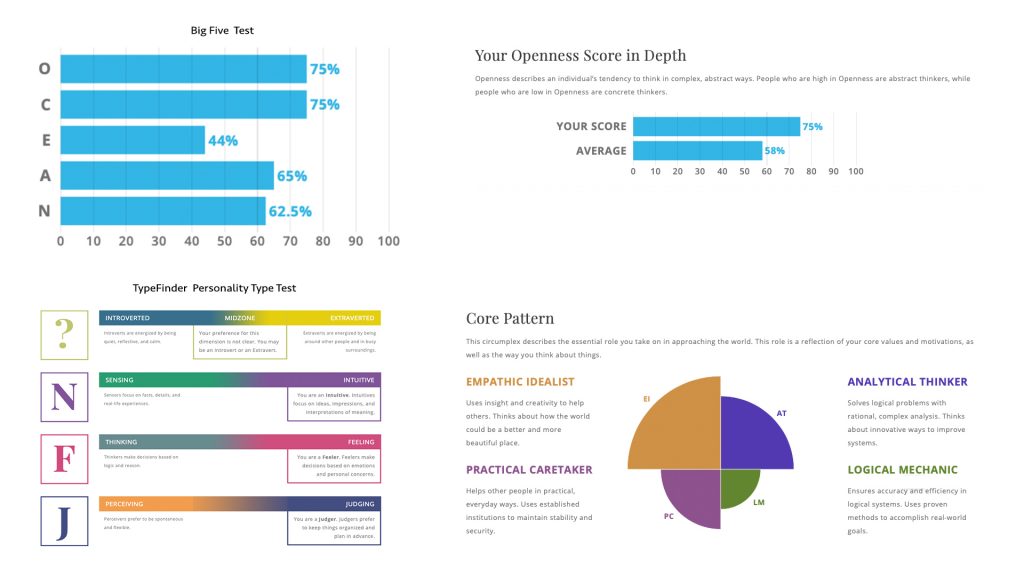
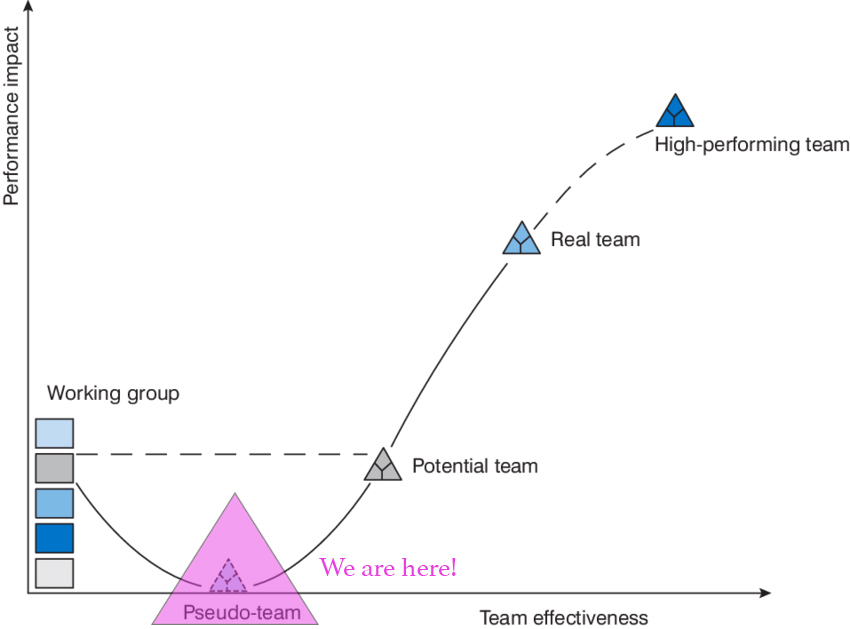
Personal and professional Goals
In parallel with this, the world keeps revolving. Over these days, the good news is that the developers of Playdate (a new indie game handheld) finally announced the release date of. This wacky yellow wonder has drawn my attention since it came out two years ago. For God’s sake, it has a crank!
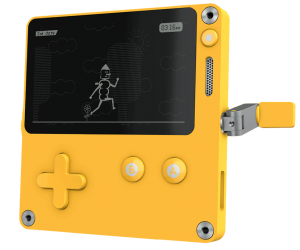
As soon as I knew about its development, I applied to get one of the few development kits. But, unfortunately, I was not selected by the manufacturers in the first round. So now I have to wait until the end of July to investigate the possibility of getting one and exploring the chance to develop games for this system.
Every new console or technology that comes out means a unique opportunity for software creators to explore this emerging market, even for an independent and low-circulation product like this one, and in most cases, those who show up first have the best possibilities to position their product and have better sales.
Still not available to the general public, the Playdate SDK will soon be available on macOS, Windows, and Linux. Apparently, there are planning two options for developers to write games: using Lua, for ease of development; or using C, for games that need extra performance.
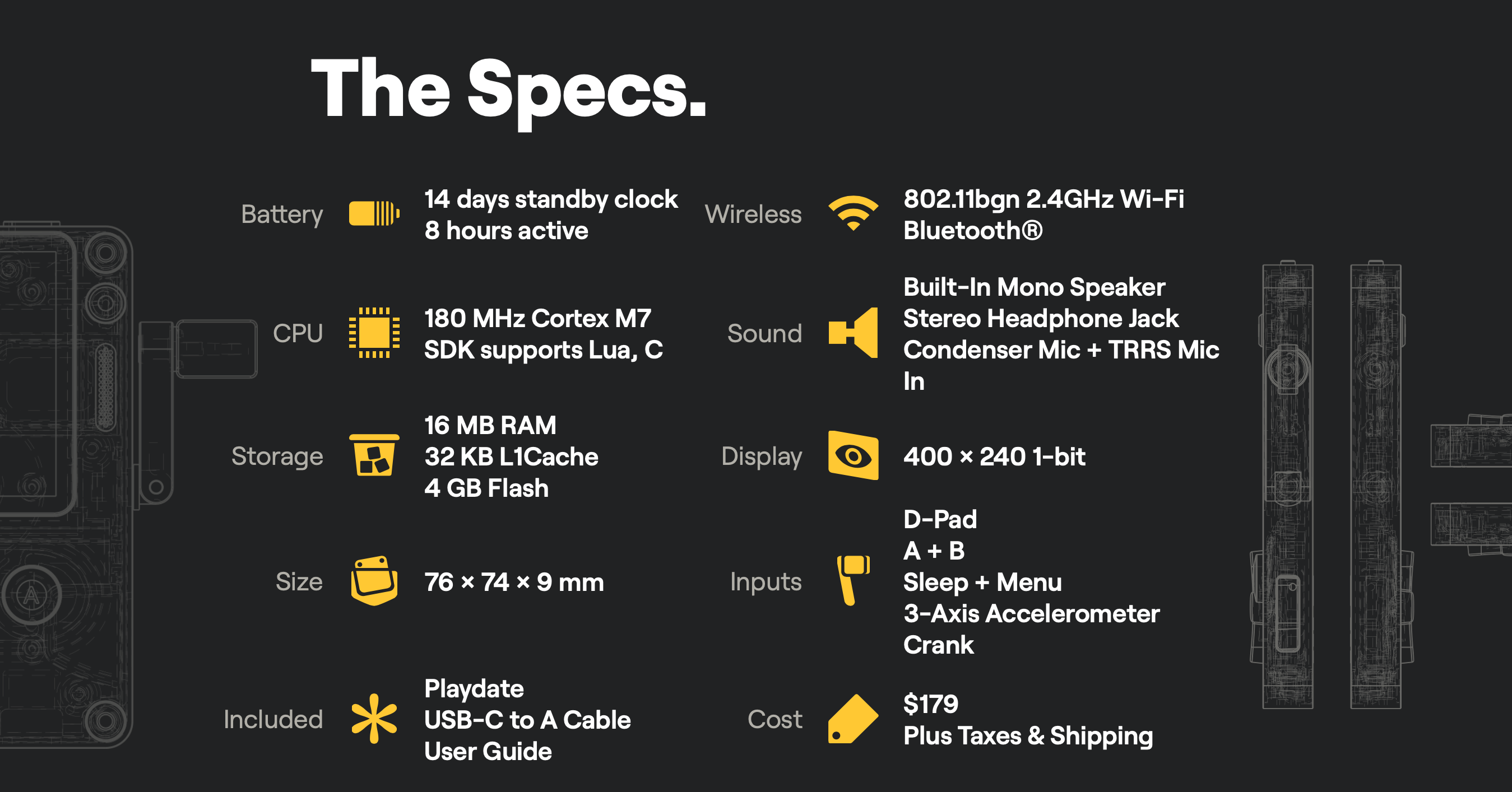
I am very interested in creating games for these amazing gadgets instead of putting a lot of money, time, and effort into the traditional markets, which, in my opinion, are insanely saturated. I would like to investigate the possibility of publishing on the platform mentioned before and on the overpriced ZX Spectrum Next.
Despite the name, the machine is not officially affiliated with the legendary Sinclair Research Ltd owned by Sir Clive Sinclair. Still, it counted with the participation to Rick Dickinson, designer of some of the original models that take the UK, Spain, Brazil, Uruguay, Argentina, and other countries by storm 38 years ago.
The ZX Spectrum Next was introduced to the fans of the classic 8 bit home computer on a very successful Kickstarter campaign back in 2017, with more than three thousand backers at a price between £280 – £640 + shipping for each unit!.
Even more, a second Kickstarter campaign took place with more than five thousand additional backers. As a result, the second batch of home computers is going to be delivered late this summer.
I want to do this mainly because of my affinity for these systems, which takes me back to my first days and coding experience with home computers and low-level programming (aka Z80 assembler). A proven user base of more than 8 thousand souls, eager for new titles for this platform is an exciting opportunity for any indie game developer worth to explore.
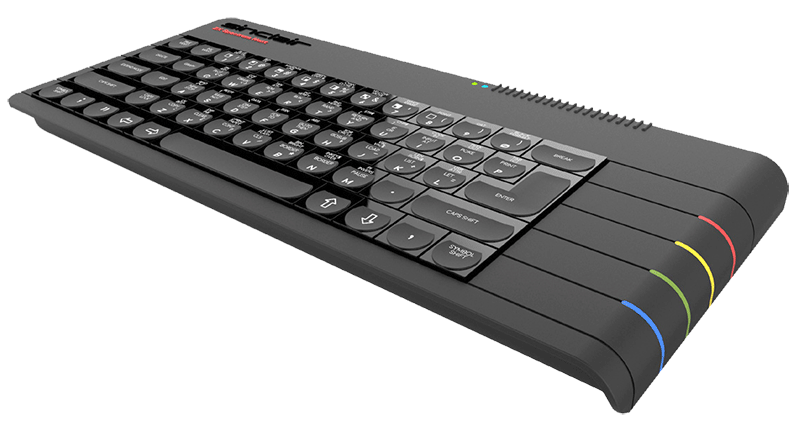
List of figures
Fig 1. Big Five and TypeFinder personality test from Truity website.
Fig 2. Team Performance Curve for The Wild Branch on Week 1 based upon Katzenback and Smith scheme.
Fig 3. Playdate tiny handheld by Panic Inc.
Fig 4. Playdate handheld technical specifications.
Fig 5. The ZX Spectrum Next by Henrique Olifiers.
References
Harms C, Jackel L, Montag C. 2017. ‘Reliability and completion speed in online questionnaires under consideration of personality’. Department of Psychology, University Bonn, Bonn, Germany.
Panic Inc. Playdate product presentation website [online] Available at: <https://play.date> [Accessed 1 Juin 2021].
BBC.com ‘ZX Spectrum Next Issue 2 blasts through Kickstarter goal’. [online] Available at: <https://boardgamegeek.com/thread/1443324/3-distinct-stages-prototyping> [Accessed 6 Juin 2021].